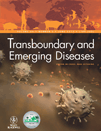
Transboundary and Emerging Diseases
Scope & Guideline
Championing open access for impactful disease research.
Introduction
Aims and Scopes
- Transboundary Animal Diseases (TADs):
The journal extensively covers the epidemiology, control, and prevention of transboundary animal diseases such as African Swine Fever, Foot-and-Mouth Disease, and others, focusing on their impacts on both animal and public health. - Emerging Infectious Diseases (EIDs):
Research on newly emerging infectious diseases that pose threats to animal and human populations is a primary focus, including studies on their origins, transmission dynamics, and control strategies. - One Health Approach:
The journal emphasizes a One Health perspective, integrating human, animal, and environmental health research to address zoonotic diseases and their implications for public health. - Molecular Epidemiology and Genomics:
The use of molecular techniques to understand the genetic diversity, evolution, and transmission mechanisms of pathogens is a key aspect of the research published in the journal. - Risk Assessment and Surveillance:
Studies that assess risks associated with disease outbreaks and the effectiveness of surveillance systems are highlighted, providing insights into monitoring and controlling infectious diseases. - Biosecurity and Control Measures:
Research on biosecurity practices, vaccination strategies, and other control measures to prevent disease transmission in livestock and wildlife is a significant component of the journal's scope. - Impact of Climate and Environment on Disease Dynamics:
The journal also explores how environmental factors, including climate change, affect the distribution and emergence of infectious diseases in animal populations.
Trending and Emerging
- Genomic Surveillance and Pathogen Genomics:
Recent publications emphasize genomic surveillance and the genomic characterization of pathogens, highlighting the importance of understanding genetic variations and their implications for disease control. - Environmental and Climate Impact Studies:
Research increasingly focuses on how climate change and environmental factors influence the emergence and spread of infectious diseases, reflecting a growing recognition of the interconnectedness of health and the environment. - One Health Integration:
There is a notable rise in studies applying the One Health approach, integrating human, animal, and environmental health perspectives to address complex health challenges. - Emerging Viral Diseases:
The journal is seeing an uptick in research centered around emerging viral diseases, particularly those that pose zoonotic threats, such as SARS-CoV-2 and its variants, reflecting the urgency of understanding these pathogens. - Predictive Modelling and Risk Assessment Techniques:
Advancements in predictive modelling and quantitative risk assessment methods are increasingly featured, aimed at enhancing surveillance and response strategies for infectious disease outbreaks. - Antimicrobial Resistance Studies:
Research on antimicrobial resistance in livestock and wildlife is gaining traction, particularly in relation to the implications for public health and food security.
Declining or Waning
- Classic Zoonotic Diseases:
Research focusing specifically on classic zoonotic diseases, such as rabies and brucellosis, has seen a decline, possibly due to the increased focus on emerging diseases and their complex transmission dynamics. - Traditional Livestock Diseases:
Studies on traditional livestock diseases that are well-characterized and have established control measures, such as older strains of foot-and-mouth disease, are becoming less frequent as newer threats gain attention. - Localized Case Studies:
There has been a reduction in localized case studies that do not offer broader implications for transboundary disease management, as the journal increasingly favors studies with global or regional significance. - Veterinary Pathology Studies:
Research purely focused on veterinary pathology without a strong connection to epidemiology or public health implications appears to be waning, as the journal aims to bridge veterinary and public health concerns.
Similar Journals
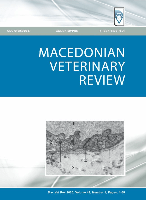
Macedonian Veterinary Review
Unleashing the potential of veterinary research worldwide.Macedonian Veterinary Review is a prominent open access journal dedicated to advancing the field of veterinary science. Published by SCIENDO, this journal provides a crucial platform for researchers, professionals, and students to share their findings and insights related to veterinary practices, animal health, and welfare. Established with the aim of fostering knowledge exchange since its inception in 2010, the journal has made significant strides, evidenced by its 2023 Scopus ranking of #131 out of 194 in the General Veterinary category, placing it in the 32nd percentile among its peers. The journal's open access model enhances the dissemination of knowledge, ensuring that vital research reaches a wider audience, thereby addressing key issues in the veterinary landscape. With its base in Macedonia and a commitment to high-quality scholarly contributions, the Macedonian Veterinary Review is an essential resource for anyone involved in veterinary research and practice, reflecting the ongoing developments and challenges in this critical field.
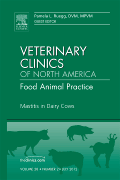
VETERINARY CLINICS OF NORTH AMERICA-FOOD ANIMAL PRACTICE
Exploring Innovations in Food Animal HealthVETERINARY CLINICS OF NORTH AMERICA-FOOD ANIMAL PRACTICE is a premier peer-reviewed journal dedicated to advancing knowledge in the field of food animal veterinary medicine. Published by W B SAUNDERS CO-ELSEVIER INC, this journal serves as a vital resource for veterinarians, researchers, and students, facilitating the dissemination of high-quality, impactful research and reviews. With an impressive Q1 ranking in both the fields of Food Animals and Medicine, and a notable Scopus rank of 2 out of 39 in Veterinary Food Animals, the journal plays a critical role in addressing the complexities and advancements in food animal health. Although it is not an Open Access journal, subscribers have access to a wealth of articles that are pivotal to the profession. Founded in 1971, the journal continues to provide cutting-edge insights and support for effective practices in veterinary medicine through 2024 and beyond. Its commitment to excellence and relevance ensures it remains an indispensable source for the latest developments in the veterinary field.
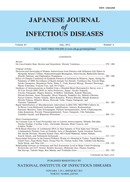
JAPANESE JOURNAL OF INFECTIOUS DISEASES
Exploring innovative solutions to combat infectious diseases.The Japanese Journal of Infectious Diseases, published by the National Institute of Infectious Diseases in Japan, serves as a vital platform for researchers, clinicians, and public health professionals committed to advancing the field of infectious disease science. With an ISSN of 1344-6304 and an E-ISSN of 1884-2836, this journal has maintained its academic rigor since its inception in 1961 and continues to contribute significantly to the global understanding of infectious diseases. The journal holds a Q3 ranking in the categories of Infectious Diseases, Miscellaneous Medicine, and Medical Microbiology as of 2023, reflecting its important role in disseminating impactful research. With many articles available through Open Access, it ensures wide accessibility to the latest discoveries and insights. Researchers can expect to find high-quality studies that address critical challenges in the control and prevention of infectious diseases, making this journal an essential resource for anyone engaging in this critical field.

Revista de Investigaciones Veterinarias del Peru
Elevating Standards in Veterinary Science and CareRevista de Investigaciones Veterinarias del Peru, published by UNIV NACIONAL MAYOR SAN MARCOS, stands as a pivotal resource within the field of veterinary sciences. With its ISSN 1682-3419 and E-ISSN 1609-9117, this journal aims to publish innovative research contributing to the advancement of veterinary practices and animal health. Since its inception in 1999, it has fostered an academic platform for professionals and researchers alike to share findings that are crucial for understanding and improving animal welfare in Peru and beyond. Although currently positioned in the Q3 category of Veterinary (miscellaneous) and ranked #163 out of 194 in the Scopus database, the journal's commitment to quality research and open access to veterinary knowledge continues to attract submissions and readership from a diverse audience. As it moves forward into 2024, the Revista de Investigaciones Veterinarias del Peru remains dedicated to disseminating critical insights that promote evidence-based practices in the veterinary field, stimulating further research and collaboration across continents.
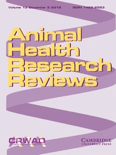
ANIMAL HEALTH RESEARCH REVIEWS
Innovating the future of animal health and welfare.ANIMAL HEALTH RESEARCH REVIEWS, published by CAMBRIDGE UNIVERSITY PRESS, stands as a premier journal dedicated to advancing the field of animal health and welfare. With an impressive Scopus rank of #22 out of 490 in the domain of Animal Science and Zoology, placing it in the 95th percentile, this journal has established itself as a crucial resource for researchers and professionals alike. Covering the evolving landscape of animal health from 1996 to the present, it offers comprehensive reviews that synthesize current research, aiming to inform practices and policies in the animal health sector. Although it operates under a subscription model, the journal promotes access to cutting-edge findings and discussions. As a recognized publication in the Q1 category for 2023, it continues to set high standards for scholarship in animal science, making it an indispensable tool for those committed to advancing knowledge and practice in the field.
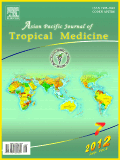
Asian Pacific Journal of Tropical Medicine
Advancing tropical health research across the Asia Pacific.Asian Pacific Journal of Tropical Medicine, published by Wolters Kluwer Medknow Publications, stands at the forefront of research in the field of tropical medicine, contributing significantly to the global understanding of health issues prevalent in the Asian Pacific region. With an ISSN of 1995-7645 and an E-ISSN of 2352-4146, this esteemed journal has been an Open Access platform since 2011, ensuring that vital research is accessible to a broad audience. The journal boasts a commendable Scopus rank of 131 out of 636 in the General Medicine category, placing it in the 79th percentile and recognizing its influential contributions to the discipline. Based in Mumbai, India, the journal spans converged years from 2010 to 2024 and is categorized in the Q3 quartile for miscellaneous medicine as of 2023. Researchers, professionals, and students can leverage this journal to stay abreast of the latest findings and developments in tropical medicine, making it an indispensable resource in their academic and professional pursuits.

Infectious Diseases of Poverty
Unraveling the links between poverty and infectious disease dynamics.Infectious Diseases of Poverty, published by BMC, is a leading open-access journal dedicated to addressing the critical intersection of infectious diseases and poverty. Since its inception in 2012, this influential journal has contributed significantly to the fields of public health, infectious diseases, and environmental health. With impressive rankings placing it in the top quartile (Q1) across multiple categories—including Infectious Diseases and Public Health, Environmental and Occupational Health—it stands as a vital resource for researchers and practitioners alike. The journal's commitment to accessibility ensures that high-quality research is available to a global audience, fostering collaboration and knowledge sharing. Based in the UK, Infectious Diseases of Poverty aims to publish innovative research that sheds light on the complexities of infectious diseases and their socio-economic determinants, ultimately working to improve health outcomes in vulnerable populations around the world. With its robust impact factor and esteemed standing within the academic community, this journal serves as an essential platform for advancing the understanding and management of infectious diseases related to poverty.

ISRAEL JOURNAL OF VETERINARY MEDICINE
Empowering Veterinary Professionals Through Open Access KnowledgeThe Israel Journal of Veterinary Medicine, published by the Israel Veterinary Medical Association, serves as a vital resource for researchers, professionals, and students in the fields of veterinary medicine and animal science. With a commitment to advancing knowledge across diverse veterinary disciplines, this journal plays a crucial role in disseminating significant findings and innovations that influence both local and global veterinary practices. Although it currently holds a Q4 ranking in both the Animal Science and Zoology and Veterinary (miscellaneous) categories, the journal's open access policy, enabling free availability of articles, aspires to increase its accessibility and engagement among the academic community. The journal's convergence of research from 2007 to 2024 showcases its dedication to continuously contributing to the evolving landscape of veterinary science.

AMERICAN JOURNAL OF VETERINARY RESEARCH
Pioneering Research for a Healthier Animal FutureAmerican Journal of Veterinary Research, published by the American Veterinary Medical Association, serves as a cornerstone of the veterinary medical community, providing essential insights from 1945 to the present. With an ISSN of 0002-9645 and E-ISSN of 1943-5681, this esteemed journal focuses on a diverse range of topics within the veterinary field, contributing to the advancement of veterinary science through rigorous peer-reviewed research. Ranking in the Q2 category in Veterinary (miscellaneous) and Q3 in Medicine (miscellaneous) category as of 2023, it holds a respectable position in Scopus rankings, further emphasizing its impact in the field. While currently not an Open Access journal, its objective remains clear: to disseminate cutting-edge research that informs clinical practice and enhances animal health and welfare. The American Journal of Veterinary Research is invaluable for researchers, professionals, and students seeking to stay at the forefront of veterinary advancements and innovations.

Acta Veterinaria Eurasia
Empowering veterinarians with cutting-edge insights.Acta Veterinaria Eurasia is a prominent open access journal dedicated to advancing the field of veterinary sciences. Published by AVES since 2002, it aims to provide a platform for innovative research and insights that enhance veterinary practices and animal welfare. With its ISSN 2618-639X and E-ISSN 2619-905X, the journal has established a growing international reputation, particularly in Turkey, and is indexed in major databases. As of 2023, it is positioned in Q4 of the Veterinary (miscellaneous) category and holds a Scopus rank of #138 out of 194 in the general veterinary domain, placing it in the 29th percentile. The journal spans a broad scope within veterinary studies, inviting contributions that foster knowledge dissemination and collaboration among researchers, professionals, and students alike. By promoting open access since its inception, Acta Veterinaria Eurasia is committed to making cutting-edge research accessible to all, ultimately supporting improved health outcomes in veterinary practice.